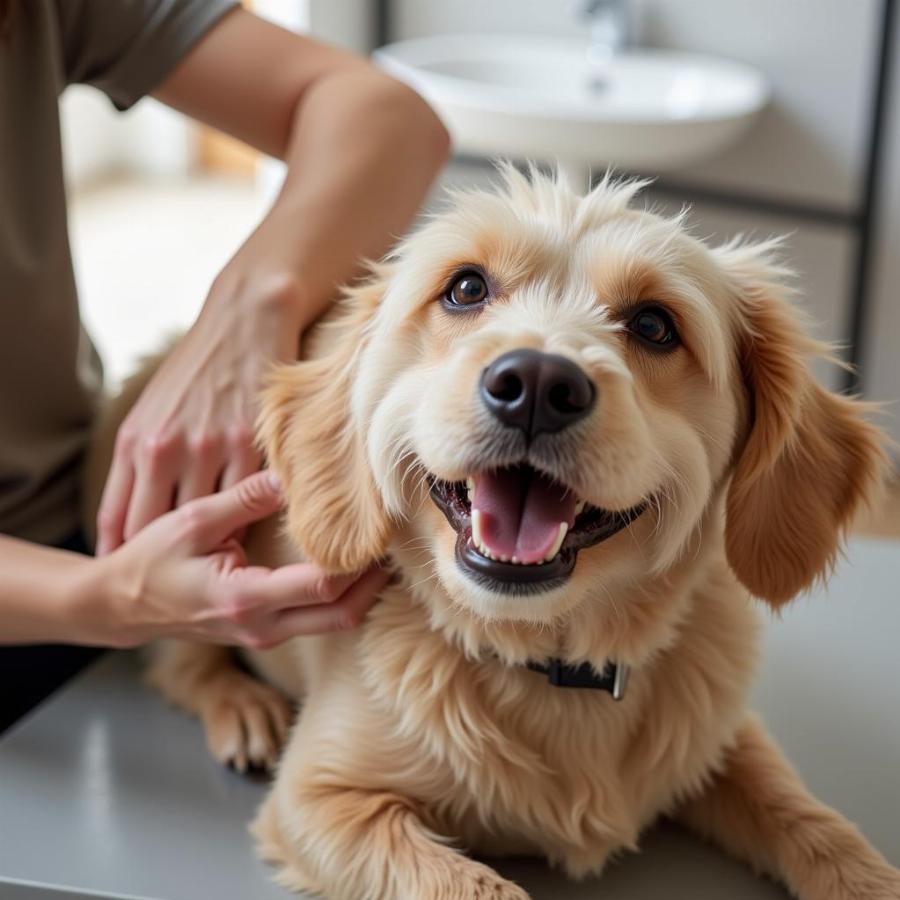Old dogs often develop a distinct smell, sometimes described as musty or sweet. If you’ve noticed your senior dog smelling a bit different, don’t worry, you’re not alone. This is a common occurrence and understanding why it happens can help you manage the odor and ensure your furry friend stays happy and healthy. This article dives into the common causes of odor in older dogs and offers practical solutions to keep your canine companion smelling fresh.
Common Reasons Behind “Old Dog Smell”
Several factors contribute to why old dogs smell. It’s rarely a sign of serious illness, but it’s always worth investigating. One of the most common culprits is decreased grooming ability. As dogs age, arthritis, decreased flexibility, and other age-related ailments can make it difficult for them to reach and clean certain areas, like their back and hindquarters. This can lead to a buildup of dirt, oil, and bacteria, causing that characteristic “old dog smell.”
Another contributing factor is dental issues. Periodontal disease, a common problem in older dogs, can cause bad breath, which adds to the overall odor. Regular dental checkups and cleanings are crucial for maintaining oral hygiene and preventing bad breath.
Skin infections are another potential cause of odor in senior dogs. Wrinkled skin folds, common in certain breeds, can trap moisture and create a breeding ground for bacteria and yeast, leading to infections and a noticeable smell.
Is Your Old Dog’s Smell a Sign of Illness?
While “old dog smell” is often attributed to normal aging processes, it can sometimes be a sign of an underlying medical condition. Kidney disease, for instance, can cause a urine-like odor on a dog’s breath. Similarly, diabetes can lead to a sweet, fruity odor on the breath. If the smell is particularly strong, sudden, or accompanied by other symptoms like lethargy, loss of appetite, or changes in behavior, it’s crucial to consult your veterinarian.
Tips for Managing “Old Dog Smell”
Thankfully, there are several ways to manage and minimize the odor in older dogs. Regular grooming is essential. Brushing your dog regularly helps remove dirt, dead skin, and excess hair, reducing the buildup of odor-causing bacteria. For dogs with mobility issues, professional groomers can provide specialized care.
 Grooming a Senior Dog
Grooming a Senior Dog
Maintaining good oral hygiene is another crucial step. Regular tooth brushing, dental chews, and professional cleanings can help prevent periodontal disease and the accompanying bad breath. Providing a healthy diet and ensuring your dog has access to fresh water also contribute to overall health and can minimize odor.
How to Tell If My Dog’s Smell is Serious?
If your dog’s smell suddenly changes or becomes noticeably stronger, it’s best to consult your veterinarian. This could be a sign of a medical condition that requires attention. Don’t dismiss any unusual odors as simply “old dog smell.”
Why Does My Old Dog Smell Like Fish?
Sometimes, a fishy odor can indicate an anal gland issue. why does my male dog smell like fish explains this issue in more detail. If you notice this specific smell, a trip to the vet is warranted.
Can a Dog’s Age Affect Their Smell?
Absolutely! Just like humans, dogs experience changes as they age, and these changes can affect their scent. Senior dogs often develop a distinct odor due to a combination of factors, including decreased grooming habits and potential health issues. Understanding these changes can help you address any concerns and keep your furry friend comfortable. why do dogs clean other dogs ears can offer additional insight into dog behavior and hygiene.
Conclusion
“Old dog smell” is a common concern among senior dog owners. By understanding the underlying causes, from decreased grooming ability to potential health issues, you can take proactive steps to manage the odor and ensure your furry friend stays healthy and happy. Regular grooming, dental care, a healthy diet, and veterinary checkups are essential for minimizing odor and addressing any underlying medical conditions. Remember, a sudden change in odor should always warrant a visit to the veterinarian.
FAQ
-
Is “old dog smell” inevitable? While common, it’s not inevitable. Proper hygiene and regular veterinary care can significantly minimize odor.
-
How often should I bathe my senior dog? Over-bathing can dry out their skin, so consult your vet for recommendations based on your dog’s breed and skin condition.
-
What are the signs of dental disease in dogs? Bad breath, red or swollen gums, difficulty chewing, and excessive drooling can indicate dental problems.
-
Can diet affect my dog’s smell? Yes, a balanced diet contributes to overall health, including skin and coat health, which can impact odor.
-
When should I be concerned about my dog’s smell? Sudden changes in odor, especially if strong or accompanied by other symptoms, should be checked by a vet.
-
Can certain dog breeds be more prone to “old dog smell”? Breeds with skin folds, such as Bulldogs and Shar-Peis, can be more susceptible to skin infections and associated odors.
-
Are there any specific products that can help with “old dog smell”? Yes, there are specialized shampoos, wipes, and sprays formulated for senior dogs that can help manage odor. yellow rain slicker for dogs can help keep your dog dry and clean during walks, minimizing the buildup of dirt and odor.
More Questions? Read These Articles
Beaut Dogs: Your Partner in Canine Care
Beaut Dogs is your comprehensive resource for all things related to dog care, offering expert advice and guidance for dog owners. From breed-specific information to health and nutrition tips, we’re here to help you provide the best possible care for your canine companion. When you need support, contact us via Email at [email protected] for detailed and accurate answers from Beaut Dogs. We’re dedicated to helping you navigate the wonderful world of dog ownership. Visit https://beautdogs.com today to learn more.